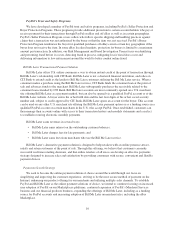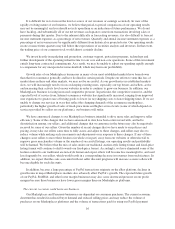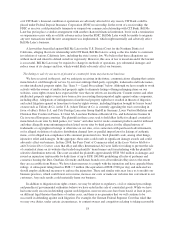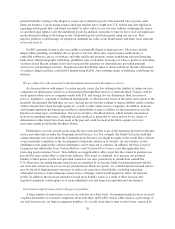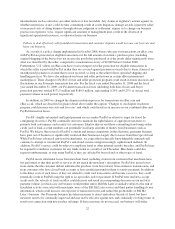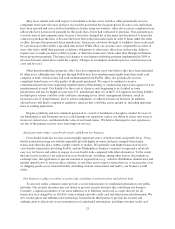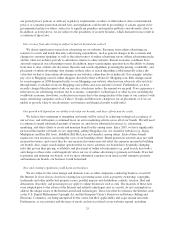eBay 2009 Annual Report Download - page 28
Download and view the complete annual report
Please find page 28 of the 2009 eBay annual report below. You can navigate through the pages in the report by either clicking on the pages listed below, or by using the keyword search tool below to find specific information within the annual report.potential liability relating to the alleged or actual sale of unlawful goods or the unlawful sale of goods could
harm our business. Certain manufacturers and large retailers have sought new U.S. federal and state legislation
regarding stolen goods that could limit our ability to allow sellers to use our sites without confirming the source
of, and their legal rights to sell, the underlying goods. In addition, from time to time we have received significant
media attention relating to the listing or sale of unlawful goods and stolen goods using our services. This
negative publicity could damage our reputation, diminish the value of our brand names and make users reluctant
to use our services.
PayPal’s payment system is also susceptible to potentially illegal or improper uses. These may include
illegal online gambling, fraudulent sales of goods or services, illicit sales of prescription medications or
controlled substances, piracy of software and other intellectual property, money laundering, terrorist financing,
bank fraud, child pornography trafficking, prohibited sales of alcoholic beverages or tobacco products, and online
securities fraud. Recent changes in law have increased the penalties for intermediaries providing payment
services for certain illegal activities. Despite measures PayPal has taken to detect and lessen the risk of this kind
of conduct, illegal activities could still be funded using PayPal. Any resulting claims or liabilities could harm our
business.
We are subject to risks associated with information disseminated through our service.
As discussed above with respect to certain specific issues, the law relating to the liability of online services
companies for information carried on or disseminated through their services is often unsettled. Claims could be
made against online services companies under both U.S. and foreign law for defamation, libel, invasion of
privacy, negligence, copyright or trademark infringement, or other theories based on the nature and content of the
materials disseminated through their services. Several private lawsuits seeking to impose liability under a number
of these theories have been brought against us, as well as other online service companies. In addition, domestic
and foreign legislation has been proposed that would prohibit or impose liability for the transmission over the
Internet of certain types of information. Our service features a Feedback Forum, which includes information
from users regarding other users. Although all such feedback is generated by users and not by us, claims of
defamation or other injury have been made in the past and could be made in the future against us for not
removing content posted in the Feedback Forum.
Furthermore, several court decisions arguably have narrowed the scope of the immunity provided to Internet
service providers like us under the Communications Decency Act. For example, the Ninth Circuit has held that
certain immunity provisions under the Communications Decency Act might not apply to the extent that a website
owner materially contributes to the development of unlawful content on its website. As our websites evolve,
challenges to the applicability of these immunities can be expected to continue. In addition, the Paris Court of
Commerce has ruled in the Louis Vuitton Malletier and Christian Dior Couture cases that applicable laws
protecting passive internet “hosts” from liability are inapplicable to eBay given that the content in question was
provided by users under eBay’s control and authority. This trend, if continued, may increase our potential
liability to third parties for the user-provided content on our sites, particularly in jurisdictions outside the
U.S. where laws governing Internet transactions are unsettled. If we become liable for information provided by
our users and carried on our service in any jurisdiction in which we operate, we could be directly harmed and we
may be forced to implement new measures to reduce our exposure to this liability, including expending
substantial resources or discontinuing certain service offerings, which would negatively affect our financial
results. In addition, the increased attention focused upon liability issues as a result of these lawsuits and
legislative proposals could require us to incur additional costs and harm our reputation and our business.
Government inquiries may lead to charges or penalties.
A large number of transactions occur on our websites on a daily basis. Government regulators have received
a significant number of consumer complaints about both eBay and PayPal, which, while small as a percentage of
our total transactions, are large in aggregate numbers. As a result, from time to time we have been contacted by
20


